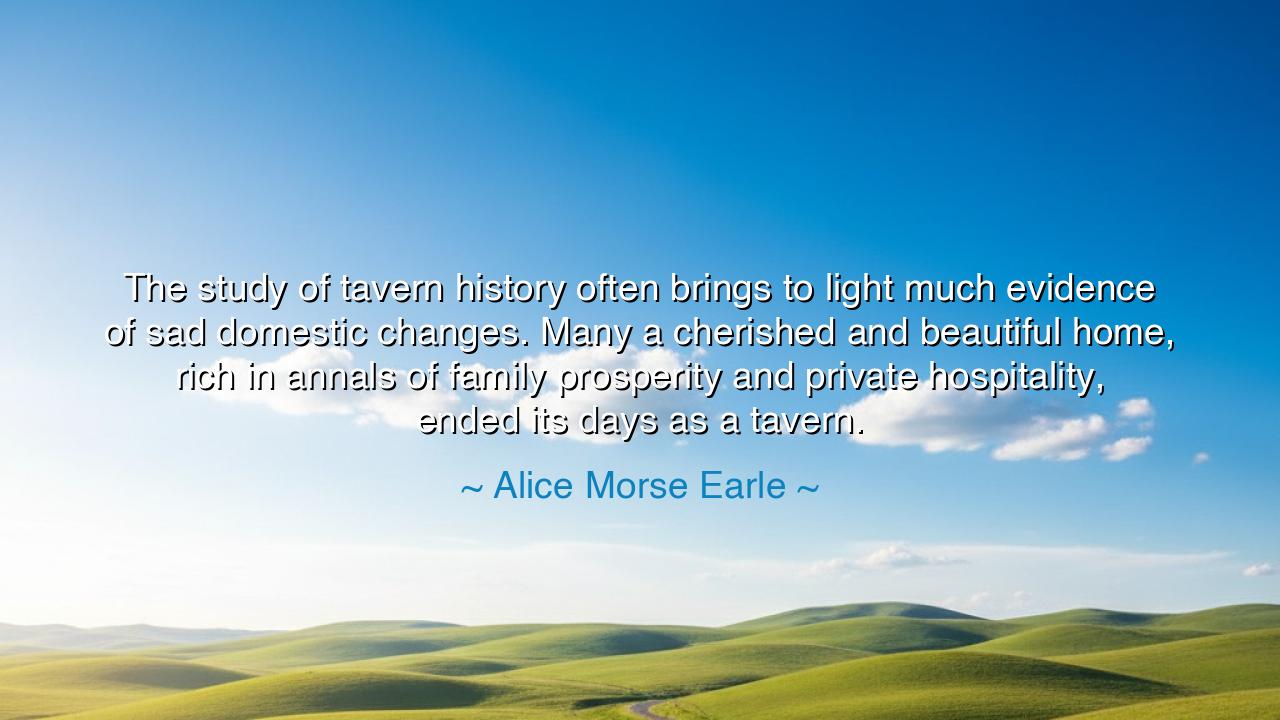
The study of tavern history often brings to light much evidence
The study of tavern history often brings to light much evidence of sad domestic changes. Many a cherished and beautiful home, rich in annals of family prosperity and private hospitality, ended its days as a tavern.






The words of Alice Morse Earle are heavy with both sorrow and wisdom: “The study of tavern history often brings to light much evidence of sad domestic changes. Many a cherished and beautiful home, rich in annals of family prosperity and private hospitality, ended its days as a tavern.” In this lament, she speaks of the transformation of homes once filled with the warmth of family life into places of commerce and public revelry. It is not the tavern itself that she condemns, but the tragedy of decline: the fall from prosperity and hospitality into loss and necessity. What was once sacred becomes profane; what was once private and cherished becomes open and exposed.
The origin of these words lies in Earle’s studies of early American domestic and social history. She traced the stories of households across generations, where wealth and harmony slowly withered, leaving only fragments of grandeur. When fortune was gone, the home—once a symbol of family pride—was sold or repurposed into a tavern. This image stands as a metaphor for the fragility of human achievement: that all prosperity, if not tended with care, can decay, and that the hearth which once sheltered joy can crumble into survival.
History bears countless examples of such change. Consider the great estates of Ireland in the eighteenth and nineteenth centuries. Many once-thriving manors, filled with art, song, and gatherings of kin, fell into ruin under debt and mismanagement. Some were abandoned; others became inns, boarding houses, or public houses. The fall was not only of bricks and mortar, but of dignity and lineage. The transformation of the noble home into the tavern was a living testimony to fortune’s fleeting nature, as well as to the sadness that clings to decline.
Yet there is more than mourning in Earle’s words. She reminds us that domestic life is the true treasure. The beauty of the home lies not in wealth or grandeur, but in its role as the keeper of memory, of hospitality, of kinship. When that sacred essence is lost—whether through greed, misfortune, or neglect—the walls may remain, but the spirit has departed. A tavern may still be lively, filled with music and drink, but the intimacy of the hearth, the purity of the family circle, has dissolved.
At the same time, her words caution against arrogance. For no family, however rich or prosperous, is immune to decline. The mighty may fall, the wealthy may be humbled, and the cherished may be cast aside. This truth, repeated in history, should inspire both gratitude and humility. To live in comfort today is no guarantee of tomorrow’s stability; therefore, one must cherish and protect what truly endures: love, memory, and integrity.
The lesson we draw is that prosperity must be held with both stewardship and reverence. Guard your household not only against the threats of poverty, but also against the decay of spirit. Value the bonds of family, the warmth of friendship, the sacredness of hospitality. For when those are lost, no walls—however grand—can preserve the home.
Practically, this means we should nurture our homes as sanctuaries of love. Let us invest more in people than in possessions, more in kindness than in grandeur. Let us pass down stories, traditions, and values, for these outlive fortune. If we fail, the house may still stand, but it may serve strangers instead of family, as in the taverns of Earle’s lament. But if we succeed, then even a humble dwelling may shine brighter than any palace.
Thus, Alice Morse Earle’s words are not only a mourning of decline but a call to vigilance. The home is a fortress of memory and love—guard it well, lest prosperity fade and it be remembered not as a sanctuary, but as another waystation on the road of history.






AAdministratorAdministrator
Welcome, honored guests. Please leave a comment, we will respond soon